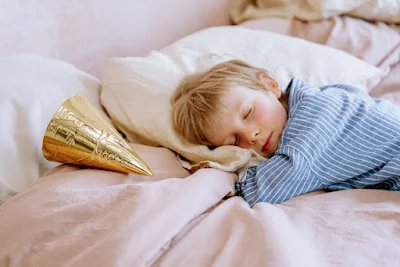Sleep Meditation for Kids :
Restful and sound sleep of children is a very important thing, for this we need a little sleep meditation. An improper amount of sleep can harm the child's functionality, lead to poor health and weaken the immune system. Mood disorders can also be seen in children who are sleep deprived.
Getting a good night's sleep can be difficult for children with attention deficit hyperactivity disorder. They have three times more difficulty falling asleep than those who do not have this diagnosis.
But the following tips can help you get your child with ADHD to sleep at night.
How Much Sleep Does Kid Need?
The quantity of sleep that each youngster need varies. These ground rules are the average of what is recommended for children to function properly:
- Babies up to 1 year – 12 to 16 hours
- 1 to 2 years old – 11 to 14 hours
- 3 to 5 years old – 10 to 13 hours
- 6 to 12 years old – 9 to 12 hours
- Adolescents – 8 to 10 hours
1- Keep Routine
A set bedtime helps kids feel safe because it's consistent. Ideally, children and adults should go to sleep and wake up at about the same time each day. This includes the weekend. If children have an earlier departure time for school (or nursery), make sure their bedtime allows them to fully rest at night.
2- Keep Kids Active After School
Keep kids physically active when they come home from school. Mobile devices keep kids sedentary, so encourage them to exercise or do gardening outside. Burning energy after school will help them feel tired when it's time to go to bed.
3- Stay Positive
For children who can't tell the time, use a special clock that can change color at bedtime and wake-up times. For older children, reward them for making the effort to go to bed at the right time. Do not punish children for getting out of bed. While constantly bringing them back to bed can be tiring, taking them back will remove the negative connotations of bedtime.
4- Medicines and Foods
There are too many sweets in baby food. Some desserts contain caffeine. Caffeine causes restlessness at any age. Watch what your child eats. Offer them healthy snacks. Be mindful of how your child's ADHD medications may affect their energy levels. Clocks may need to be adjusted for a good night's sleep.
5- Spend Time Together
The craving for attention can contribute to children being restless at bedtime. Spending some time with the kids, asking how their day was going, or talking to them about common interests can help them calm down. For babies, a few minutes of cuddling and singing can make a big difference.
6- Be Aware of Contributing Factors
Children with ADHD are more likely to have nightmares, anxiety, and bedwetting. While these are directly related to their medical condition, there are things parents can do to reduce the tension involved. Something as simple as stopping fluid intake an hour or so before bedtime can alleviate the need to go to the bathroom in their sleep.
7- Practice Relaxation Techniques
You should try to do some things before bed to help your kids calm down. Reading stories, meditating, and stretching before bed can help calm and soothe them. If your child still wakes up sluggish despite trying these, check their bed. Sometimes a very worn mattress can contribute to a restless night.
8- Are Your Kid Afraid of the Dark?
All kinds of children are afraid of the dark. Doctors recommend teaching coping phrases and bold self-talk to help kids. Games like treasure hunting with a flashlight can help frightened children not associate darkness with negativity.
9- Don't Change The Bedtime
Children of school age require 9 to 11 hours of sleep per night. But those who get up early get up early, even if you go to bed later; night owls also do not fall asleep until their bodies are ready. That's why it's important for parents to set a bedtime that allows them to get plenty of sleep and wake up on time.
10- Set a wake up time
Have a wake up time, based on how much sleep your child needs and when he goes to bed. In order for parents to prevent stress in the future, it is necessary to establish a wake-up routine in the preschool years. And of course, you must follow this program in the first place. You may want to let your child sleep later on the weekends, but your generosity may backfire in the long run. These extra hours of sleep can make it harder for them to feel tired before bed. But if you make bedtime and wake-up times in the same time zone every day, both parties' lives will be easier.
11- Establish a Pre-bedtime Routine
The time between dinner and bedtime; It should include light playtime, a bath, brushing teeth, a story/story/book hour, and a bedtime plan. Aim for a relaxing routine that creates the ideal bedtime atmosphere. Thus, your child's body can automatically begin to go to sleep step by step at the beginning of this routine.
12- Turn off screens at least 2 hours before bedtime
Melatonin is an essential part of sleep wake cycles. When melatonin levels reach their highest level, most people become sleepy and ready for bed. According to a 2017 study, exposure to blue light from a television screen, phone or computer monitor just before bedtime delays your child's falling asleep by 30-60 minutes. make the bedroom a screen free zone, or at least make sure all screens are dark before bed. Put your phone on silent when you're in your child's room, or better yet, don't take it with you at all. Fill screen time with a book reading activity that will give her brain a rest.
13- Reduce Stress Before Sleep
Cortisol, sometimes known as the "stress hormone" is a hormone that affects sleep. When cortisol levels are high, your child's body cannot shut down the system and sleep. Keep bedtime activities calm.
14- Create a Sleep-inducing Environment
Soft sheets, dim light and silence help your child distinguish between day and night, making it easier to fall asleep. Reducing distractions sets the stage for sleep.
15- Cool is good
Your child's sleep cycle is sensitive not only to light but also to temperature. Melatonin levels help regulate the internal body temperature drop needed for sleep. You must also maintain the external balance. Do not wrap your child too much or keep the room temperature too high. Dress him in breathable cotton pajamas and keep his bedroom in the 18-21 degree range.
16- Be on the lookout for sleep disorders
Even the best- laid plans don't always turn out the way you expect them to. If your child has trouble falling asleep, has constant nightmares, is snoring or is breathing through his mouth, he may have a sleep disorder. When you suspect such a situation, seek expert help without delay. So the whole family can get a good night's sleep.
Conclusion:
Don't worry if your child doesn't respond immediately to your coping techniques. Sometimes these things take time. Some children regress as they approach new milestones in their development. Trust your intuition about change as you both move forward. Hope you all like this article about Sleep Meditation for Kids.
You may also be interested in our articles on these topics:





















0 Comments